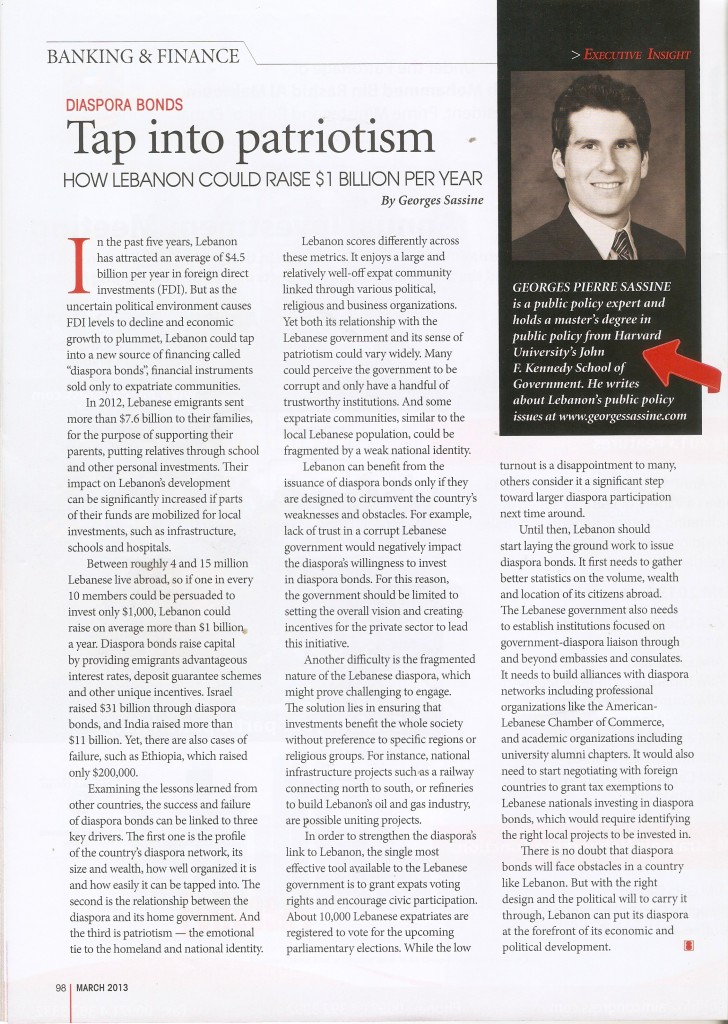By Georges Pierre Sassine on March 19, 2013
A version of this article appeared in the March 2013 online edition of Executive Magazine.
Lebanon is making progress in developing its oil and gas resources. Offshore seismic surveys are completed, the Petroleum Administration is finally formed and the licensing round for oil companies to bid on offshore exploration has been launched.
The Lebanese government is rightly focusing on developing petroleum resources in its direct waters. However, Lebanon has yet to fully demarcate its maritime borders with Cyprus, Syria and Israel. Petroleum discovered in contested areas could prevent Lebanon from extracting parts of its resources and risk to pose a serious security threat.
The focus so far has been on the border dispute with Israel. Traditional resolution strategies of maritime border disputes are not easily applicable to the Lebanese-Israeli case.Georges Sassine
The focus so far has been on the border dispute with Israel. Traditional resolution strategies of maritime border disputes are not easily applicable to the Lebanese-Israeli case.
Direct negotiations between the two countries or joint development agreements – where Israel and Lebanon cooperate to access hydrocarbons instead of dividing the territory – are not applicable. The countries are at war and will not negotiate face to face.
Another option is to resolve the dispute through formal legal proceedings. The International Court of Justice, the International Tribunal for the Law of the Sea and the Permanent Court of Arbitration are all different platforms that could resolve the dispute.
However, Israel has not signed or ratified the United Nations Convention on the Law of the Sea (UNCLOS), which means that Lebanon cannot force Israel to court. Lebanon could pursue an international media and diplomatic campaign to get Israel to sign the UNCLOS, enabling Beirut to bring Tel Aviv before a binding judicial tribunal or panel of arbitrators. But this remains a challenging path to undertake given that Lebanon does not acknowledge the existence of the state of Israel, and political resistance is to be expected as part of Lebanese public opinion perceives international courts to be biased towards Israel.
Searching for a settlement
As such, the most realistic proposal may be for some kind of indirectly negotiated settlement, though any such process will be lengthy and complex.
It is not unlikely that a new oil and gas field will be found in disputed Lebanese-Israeli waters while at the same time extending into Cypriot waters.Georges Sassine
As exploration in the Eastern Mediterranean continues it is not unlikely that a new oil and gas field will be found in disputed Lebanese-Israeli waters while at the same time extending into Cypriot waters. Cyprus is divided into two main parts: the Republic of Cyprus – a member state of the European Union – and the Turkish controlled area in the north. This is likely to pull both the European Union and Turkey into the fray.
Lebanon could then find itself in a scenario where instead of dealing only with Israel it is drawn into a multi-stakeholder dispute directly involving Cyprus, Turkey, the EU and probably the United States as a broker.
Such a scenario has been studied by Harvard Professor, Meghan O’Sullivan, and several students from Harvard University and the Massachusetts Institute of Technology (MIT) in a Geopolitics of Energy competition. In looking for ways to avoid a conflict, two broadly different approaches have been suggested.
The first is the ‘politics before economics’ pathway, which suggests that a complete political resolution of conflicts between Lebanon and Israel on one hand, and Turkey and Cyprus on the other hand need to be resolved before the gas can be developed. The development of eastern Mediterranean gas would be included in a comprehensive regional peace initiative. Until then, petroleum resources in disputed areas would remain untapped and conflict avoided. However, immediate prospects for such a regional agreement are slim at best.
The second proposal suggests the development of disputed oil and gas fields while waiting for a final political resolution of territorial disputes. In this case, Lebanon and Israel as well as Cyprus and Turkey would agree to disagree. Each side would hold on to its claims but agree to a third party developing disputed oil resources until big political issues are resolved. Revenues could be split or frozen in foreign accounts and by the time a political resolution of disputed areas is reached revenues would then be distributed according to each country’s respective share.
Such a model has its challenges as well but nevertheless has been proven viable. In the 1940s Saudi Arabia and Kuwait both claimed a 5,770 square kilometer area along their borders and as such created a neutral zone. They shared equal rights to oil concessions until they reached an agreement to formally divide the territory in the mid-1960s. Australia and East Timor provide a similar case in 2003 as they postponed the settlement of their boundaries for 50 years and pursued the development of common resources under agreed guidelines.
There is no doubt that potential oil and gas resources in contested waters provide serious risks to Lebanon. While the current unspoken agreement seems to be that both Lebanon and Israel will not explore in the conflict area, Lebanese remain nervous that Israel would decide to unilaterally develop these fields and provoke retaliation from the Lebanese Armed Forces or Hezbollah. Any option to avoid this issue will prove complex. This is why as the Lebanese government accelerates the exploitation of undisputed areas it should in parallel devote time and resources to manage risks on its maritime borders. A team of legal, diplomatic, military and political experts should plan and prepare for Lebanon to successfully defend its rights, develop its entitled resources and avoid conflict.
Georges Pierre Sassine holds a master’s degree in public policy from Harvard University’s John F. Kennedy School of Government. He writes about Lebanon’s public policy issues at www.georgessassine.com

